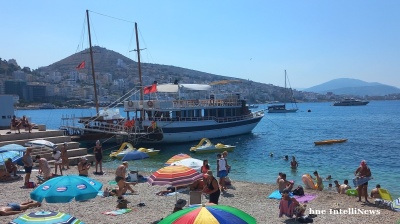Neither the EU nor the Western Balkans are currently ready for accession, says a new report from Erste, which compares the performance of the Central European countries that joined in 2004 with their counterparts from former Yugoslavia.
Erste analysts look at the strong performance of five Central European states in the 20 years since accession, pointing out that they are now “significantly wealthier” than if they had not joined the bloc.
Meanwhile, the aspiring members from the Western Balkans risk slipping further behind as existing EU members benefit from substantial EU funds.
“Convergence of WB4 countries is too slow [with the] 30 and without EU accession this is unlikely to change. Currently neither side is ready. The 20 EU is reluctant to enlarge, and the Western Balkan countries are reluctant to reform in a meaningful way,” says the report.
For countries in Central Europe that joined the EU in 2004, the economic impact has been significant. Erste's analysis shows that EU membership has increased GDP per capita by 40% in Poland, 19.4% in Slovakia and 19.0% in Czechia.
In contrast, the Western Balkan nations, which were not part of this enlargement wave, lag behind economically. Looking at four states from the region – Bosnia & Herzegovina, Montenegro, North Macedonia and Serbia – Erste estimates suggest that if the Western Balkans had joined the EU in 2004, their GDP per capita could be higher by between 53% in Montenegro to as much as 107% in Bosnia.

Source: Erste.
The report argues that the absorption of EU funds has been a critical factor in the convergence process for current member states. However, it cautions that funds alone are not enough, citing Greece and Slovakia as examples where high fund absorption did not lead to economic success. Yet countries like Romania, Bulgaria and Croatia have shown that economies can benefit significantly from inflows of EU funds.
Even initiatives such as the New Growth Plan for the Western Balkans, comprising €6bn in grants and loans for the period 2024-27, are relatively small compared to the funding for EU members.
The New Growth Plan, as Erste analysts point out, adds up to only €500mn a year in grants for the Western Balkans – one twelfth of the amount Croatia is set to receive on a per capita basis through the NextGen facility.
Thus, despite recent economic growth in the Western Balkans, living standards remain well below those of CEE countries. "Western Balkan growth outperformed recently but the standard of living is still far behind CEE members which joined the EU," the report says.

Source: Erste.
The post-pandemic recovery has seen varied performances across the region, with manufacturing-focused economies like Serbia and North Macedonia facing challenges, while tourism-dependent nations like Montenegro have benefited from increased demand.
The report highlights the need for renewed commitment from both the EU and the Western Balkans to overcome the current impasse. "The most obvious explanation for the impasse is the EU’s own lack of commitment to the Western Balkans," Erste points out. Historical crises and geopolitical priorities have often overshadowed the enlargement agenda, keeping the Western Balkans low on the EU's list of priorities.
"The most obvious explanation for the impasse is the EU’s own lack of commitment to the Western Balkans. The region is firmly on the union’s agenda but has never been a top item. Between the eurozone crisis in the early and mid-2010s, the crisis in Ukraine in 2014-2015, the refugee wave in 2015-2016, the coronavirus pandemic, and the more recent Russian aggression in Ukraine, there is always another priority that relegates [the Western Balkans] further down on the union’s to-do list,” according to Erste.
"That said, there is general consensus that in the past two years the EU has woken up to the reality of the importance and urgency of enlargement,” it adds.
In August 2023, European Council President Charles Michel proposed a deadline of 2030 to complete the necessary steps for Western Balkan EU accession. However, achieving this goal requires consensus among all 27 EU member states and political alignment within the candidate countries. Recent moves by the European Council to recognise the candidacies of Ukraine, Moldova and Georgia have further complicated the enlargement process, potentially shifting focus away from the Balkans.
Meanwhile, although EU membership is still supported by the majority of Western Balkan citizens, enthusiasm is waning. Only 34% believe accession will happen by 2030, down from 40% in 2021. Euroscepticism is particularly strong in Serbia.
And with hope for accession waning, young people in particular thinking of a future outside the region; overall 71% of young people are considering leaving their home countries.
Features

Slovenian consumers take energy giant GEN-I to court over price hikes
The Slovene Consumers’ Association accused GEN-I of unlawfully raising household prices at the height of the recent energy crisis.

Indonesia's $12bn stimulus play
The coordination between the Finance Ministry and the presidency signals tighter executive cohesion under President Prabowo’s leadership, contrasting with the cautious fiscal stance of prior administrations.

COMMENT: For Asia, dealing with Europe isn’t about achieving success; it’s about concealing failure
To be taken seriously in Asia, Europe must rediscover the courage to deliver, not merely declare. Asia has moved on to execution. Europe is still editing its initial policy draft.

Washington has a new focus on a Caspian energy play
For most of the last three decades since winning independence, Central Asia has been a bit of a backwater. Not any more. The Trump administration is becoming more focused on Turkmenistan's vast gas reserves and can smell money and power there.




